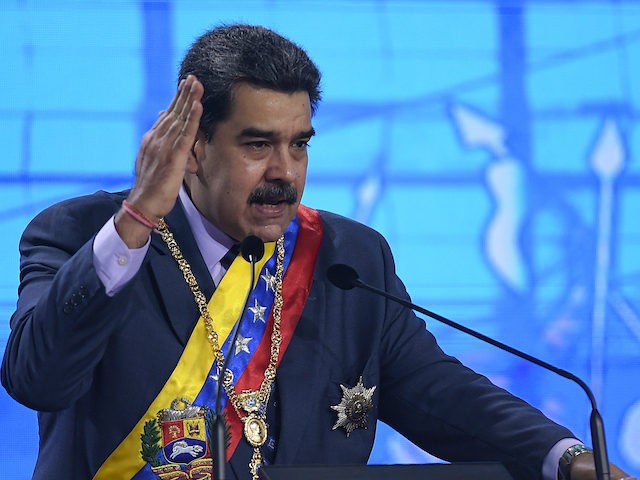Venezuela’s socialist regime failed to obtain the necessary votes to be reelected into the United Nations Human Rights Council for a three-year term during the body’s elections on Tuesday.
The Maduro regime, which has clung to power in Venezuela since holding sham elections in 2018, was recently accused by a United Nations fact-finding mission of having committed heinous crimes against humanity against citizens and political dissidents. The United Nations confirming the regime’s status as a human rights abuser did not prevent the Maduro regime from occupying a seat on the Human Rights Council for the 2020-2022 term, set to expire on December 31. The socialist regime was hoping to be reelected for the 2022-2024 term.
The United Nations distributes the 47 seats of the Human Rights Council among regional groups, of which eight are assigned to Latin American and Caribbean member states. For the 2022 election, held by secret ballot, two vacant seats were up for grabs for the Latin American and Caribbean group.
The Maduro regime was competing for one of the two available seats in the region against Chile and Costa Rica, both of which obtained more votes than Venezuela in the election. Chile obtained 144 votes, Costa Rica 134 votes, and the Maduro regime obtained 88 votes. The Maduro regime’s failure to be reelected is the second setback suffered by the rogue socialist regime in the U.N. Human Rights Council this month after the Council voted on Friday to renew the Independent Fact-Finding Mission for Venezuela for an additional two years.
Prior to the election, non-governmental organizations such as Human Rights Watch and U.N. Watch launched campaigns to raise awareness of the Maduro regime’s crimes against humanity, urging member states not to reelect the socialist regime for a new three-year term in the Human Rights Council.
Hillel Neuer, executive director of U.N. Watch, stated in a report this month, “Electing Venezuela’s Maduro regime once again as a U.N. judge on human rights, at a time when its top leaders are accused of ordering torture and other atrocities, would be a slap in the face to millions of Venezuelans suffering from human rights abuses, as well as to millions more who were forced to flee the failed state.”
In a press conference dated October 11, Juan Guaidó, Venezuela’s legitimate but powerless president, commented on the Human Rights Council election results.
“That Maduro has received a beating at the UN speaks to the fact that the victims are being protected, that we are seeking justice,” Guaidó stated.
Several members of the Venezuelan “opposition” and other non-government organizations also commented on the election results. Erstwhile presidential candidate and “opposition” figurehead Henrique Capriles Radonski stated that “the decision reflects the work of NGOs, victims, and their families who continue to denounce and demand justice. Venezuelans want justice.”
Rafael Uzcategui, director of the human rights organization Provea, told CNN that Maduro benefits from the fact that media have “normalized” the Venezuelan state collapse “and in front of this normalization, the only barrier is the work of multilateral bodies like the Council.”
While the Maduro regime will be out of the U.N. Human Rights Council by January 1, 2023, other member states with notorious track records of human rights violations continue to occupy seats in the Council, such as China, Cuba, and Qatar.
Furthermore, nine of the 18 candidates that participated in the Human Rights Council’s 2022 election have been previously flagged by the United Nations’ Secretary-General report for carrying out reprisals against human rights defenders — of which seven member states have been now elected to the Human Rights Council for the next three years: Algeria, Bangladesh, Kyrgyzstan, Maldives, Morocco, Sudan and Vietnam.
China, which currently occupies a seat on the Council for the 2021-2023 term, obtained a victory after the Human Rights Council failed to approve a resolution to discuss — but neither condemn nor acknowledge — China’s ongoing genocide of Uyghur, Kazakh, Kyrgyz, and other Turkic people in East Turkistan.
The Maduro regime, along with Cuba’s Castro regime, and other notorious human rights violators, were among the members of the Human Rights Council that voted to reject the resolution. Other states with friendly ties to China, such as Ukraine and Brazil, abstained from the vote, helping prevent a discussion of the genocide.
Russia, which was a member of the Human Rights Council, was expelled in April following their invasion of Ukraine.
The Human Rights Council itself cannot prosecute U.N. member states that practice said human rights violations — although investigations mandated by the Council can be then used before national and international courts.
Christian K. Caruzo is a Venezuelan writer and documents life under socialism. You can follow him on Twitter here.

COMMENTS
Please let us know if you're having issues with commenting.